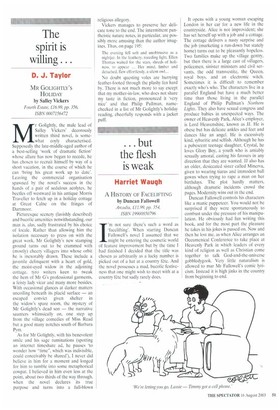The spirit is willing . . .
D. J. Taylor
MR GOLIGHTLY'S HOLIDAY by Salley Vickers Fourth Estate, £16.99, pp. 356, ISBN 0007156472 mrGolightly, the male lead of Salley Vickers' decorously written third novel, is somewhat coyly characterised. Supposedly the late-middle-aged author of a best-selling 'work of dramatic fiction' whose allure has now begun to recede, he has chosen to recruit himself by way of a short vacation, in the course of which he can 'bring his great work up to date'. Leaving thc commercial organisation spawned by the novel's success in the hands of a pair of sedulous acolytes, he beetles off westward in his antique Morris Traveller to fetch up in a holiday cottage at Great Caine on the fringes of Dartmoor.
Picturesque scenery (lavishly described) and bucolic amenities notwithstanding, our man is, alas, sadly frustrated by his choice of locale. Rather than allowing him the isolation necessary to press on with the great work. Mr Golightly's new stamping ground turns out to be crammed with (mostly) cheery villagers into whose orbit he is inexorably drawn. These include a juvenile delinquent with a heart of gold, the moist-eyed widow in the adjoining cottage, tyro writers keen to tweak the hem of Mr G's professional garments, a feisty lady vicar and many more besides. With occasional glances at darker matters uncoiling beneath its placid surface — an escaped convict given shelter in the widow's spare room, the mystery of Mr Golightly's dead son — the narrative saunters whimsically on, one step up from the village comedies of Miss Read but a good many notches south of Barbara Pym.
As for Mr Golightly, with his benevolent smile and his sage ruminations (spotting an internet timeshare ad, he pauses 'to wonder how "time", which was indivisible, could conceivably be shared'), I never did believe in him for a moment and longed for him to tumble into some metaphorical cowpat. I believed in him even less at the point, about two thirds of the way through, when the novel declares its true purpose and turns into a full-blown
religious allegory.
Vickers manages to preserve her delicate tone to the end. The intermittent pantheistic nature notes, in particular, are possibly more amusing than the author imagines. Thus, on page 195: The evening fell soft and unobtrusive as a nightjar. In the feathery, receding light. Ellen Thomas waited for the stars, shreds of holiness, to appear ... Her mind, limber and detached, flew effortlessly, a silent owl...
No doubt questing voles are hurrying feather-footed through the plashy fen hard by. There is not much more to say except that my mother-in-law, who does not share my taste in fiction, pronounced it 'very nice' and that Philip Pullman, namechecked in a list of Mr Golightly's holiday reading, cheerfully responds with a jacket puff.










































































 Previous page
Previous page